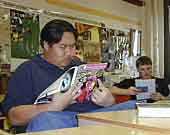
The First Test
by Tim Pugmire
February 8, 2000
|
This year's high school seniors are the first Minnesota students who must pass basic standards tests to graduate. The tests are the first part of the state's high school graduation standards. Most students passed the tests on their first attempt, back in eighth grade. But thousands of other seniors have repeatedly failed the math or reading exams, and are now in danger of not getting their diplomas this spring. THE STATE'S GRADUATION REQUIREMENTS have two parts: the basic standards and the high standards, which are known as the Profile of Learning. Minnesota eighth-graders began taking the basic standards tests in 1996. The class of 2000 is the first that must pass those reading and math exams to graduate. The state added a tenth-grade writing test requirement last year for the class of 2001 and beyond.
Christine Jax, commissioner of the Department of Children, Families and Learning, says the tests serve as an educational safety net. Jax: I look at the basic standards, the basic skills tests, as a guarantee to the students that they are employable, that they have learned enough to go out and get a job and be self-sufficient. So, when people say that it's a safety net, I think that they see it as minimal expectation to make sure people can take care of themselves.At last count, 5.9-percent of the current 12th graders in Minnesota, or 3,900 students, had not passed either the basic-standards reading or math tests. But nearly 1,700 are special-education students, who may be exempted from the test or be allowed to use a lower passing score. Overall, Minneapolis and Saint Paul have the most seniors who haven't passed the tests. Students in a remedial reading class at Roosevelt High School in Minneapolis take turns reading aloud from Shakespeare's Hamlet. The two-hour class is designed specifically for seniors who haven't passed the basic-standards reading test. Teacher Fayette Shore says she likes to give her students a broad reading experience, but most of the class time is spent with the non-fiction, newspaper-style stories found in the high-stakes test. Shore: I teach to the test, and I have no problem with that. We are extremely focused on getting them through the test and making sure that they can graduate.
Keophilavanh: Those passages are too long. And then when I looked at the first one, I got half way and I just knocked off for some reason. I woke up four hours later, and I just like tried it. Most of the questions I just filled them in, like going A, B, C, whatever.Keophilavanh says he still managed a score of 68 - close but not good enough. Last year, he was homesick on test day. He also skipped the required remedial summer-school classes. This year it's crunch time, and Keophilavanh says he's got a whole new attitude about wanting to do well on the test. He also says he accepts the fact he must pass to graduate. Keophilavanh: Most people might not think it's fair because they're thinking the last year's class walked right through and didn't have to take it. But I know a lot of people, my friends that graduated last year, they didn't learn nothing. Now they're out in the world trying to make money or try to get a job. They can't do it because they don't have the skill to do it.But his teacher is less convinced about the necessity of the state reading test, especially if it prevents a student from wearing a cap and gown at graduation. Fayette Shore says she doesn't agree with holding back diplomas from seniors. Shore: Last year they would have exited our school. They would have gone on to find jobs or go to some sort of post-high school training, and I know they would have been very successful. And, I kind of feel like we're creating a new underclass of students.
Frost: The data sort of suggests that students who began in the Minneapolis system when they're in kindergarten and all the way through eighth grade, they do very well. But I think the problem is as I see it, is that we have such an influx of kids from other districts who are poorer than the Minneapolis district in terms of their ability. And when they come, they're sort of behind, and it's awfully difficult to those kids caught up with the Minneapolis kids.Despite the obstacles, teachers are under increasing pressure to improve test scores and graduation rates. Like most school districts, Minneapolis has reshaped much of its teaching to help students pass the basic-standards tests. Summer school is required for students who've failed the tests. And students can also attend after-school remedial programs. Carol Johnson, superintendent of Minneapolis public schools, says she's optimistic those efforts will pay off. Johnson: I believe that our teachers are working incredibly hard to make sure everything possible is being done to offer students additional learning opportunities. Our high schools, in particular, have designed individualized plans, but those individualized plans also require the cooperation and support of students.
Jax: We can't back down on the basic-skills tests because if we do, we're lying to students. It's what I'm calling "the big educational lie." If we give diplomas to students when they haven't earned them, if they can't do basic reading and basic writing and basic math, then we have lied to them about their ability to hold down a job and to move forward with any other education.Minnesota students took the eighth-grade reading and math tests on February 1st and 3rd. State education officials say they plan to get 12th graders scores back as soon as possible, so those who fail can take another shot April 17th and 18th. The class of 2001 and beyond faces a 75-percent passing score on the reading and math tests, and must also pass the 10th grade writing test. |
||||||||||||||||||||||||||||||||||||||||||||||||


